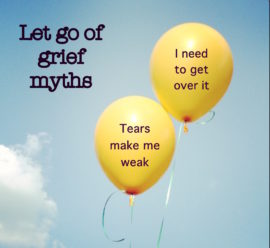
by Dr.Moira Borg MD Gestalt Psychotherapist
In general, we tend to associate loss and grief with the death of a loved one. However it is not the case. A loss is experienced with any life event that we perceive as negative, and which results in long-term changes in our social situations, relationships, or way of viewing the world and ourselves.
This definition of loss thus opens up the repertoire to all the negative experiences that bring about a tangible change in our way of being in the world and can extend to more than one faction of our lives and cause a number of consequences. Likewise loss can be personal as in experiences of illness, infertility or abuse of any sort, interpersonal as in family breakdown or loss of a loved one through death, disease or conflict, material like the loss of a job or a home or having to leave the country or symbolic such as losses related to racism or sexual orientation.
Such losses are tangible and thus can be addressed in one way or the other unlike intangible psychological losses like changes in self-worth due to harassment or bullying, alterations in one’s sense of control or safety which come with experiences of terrorism or crime or in one’s sense of identity related to parenthood, widowhood or simply going through adolesence to adulthood. Such experiences are harder to put one’s finger on and thus to understand likewise making it more difficult to be reached and understood.
Psychiatrist Dr. Elisabeth Kübler-Ross, a pioneer in studies of near death experiences, describes 5 stages in the grief process namely denial, anger, bargaining, depression and acceptance and believes that: “Any natural, normal human being, when faced with any kind of loss, will go from shock all the way through acceptance.” Such experiences can be seen as tools to help us frame and identify what we may be feeling but they are not stops on some linear timeline in grief. On the other hand, grief is a pervasive experience where the individual has to grope his/her way through a different world which emerged as a result of the loss and with the gradual adjustment to it until he/she manages to find a new way of being and belonging.
The overall haziness that surrounds loss means that there is a general lack of comprehension around such experiences. As a result, many indiviudals going through loss and grief fail to get the support they so much need in such trying times as they lack the clarity to reach both within themselves and around them to tap on the strengths at hand. This is compounded by the hardship and challenge that survivors of any loss have to go through, especially in the Western world, with the perception that grief is a linear process that has a specific timeline which ends with acceptance and “moving on”. Likewise the trauma and the resultant necessary process of adjustment and change are not acknowledged leaving the individual completely alone desperately trying to find a way to become whole again.
I believe that a loss of any kind is a reality that irrevocably changes the affected person’s world and thus inevitably who he/she becomes in that world. Likewise a person can never move on from a loss but needs to be supported to start living again in an existence which at times would have changed drastically. Ironically, the pressure to move only serves to compound the pain and sheer difficulty to cope when on the other hand the pain can be used as a medium of self-realisation and growth.
“Every hardship is an opportunity that you are given, an opportunity to grow. To grow is the sole purpose of existence on this planet Earth. You will not grow if you sit in a beautiful flower garden, but you will grow if you are sick, if you are in pain, if you experience losses, and if you do not put your head in the sand, but take the pain as a gift to you with a very, very specific purpose.”.
Dr.Elisabeth Kübler-Ross – 1995
